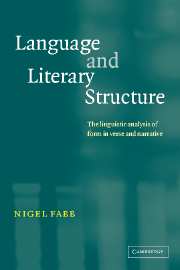1 - Literary form
Published online by Cambridge University Press: 22 September 2009
Summary
What is literary form?
A text has literary form if certain statements are true of the text. Consider, for example, the following statements about a text:
It is a sonnet.
It is divided into lines.
The lines are grouped by rhyme into a group of eight lines and a group of six lines.
It is in iambic pentameter.
These statements are all true of the following text:
Say over again, and yet once over again,
That thou dost love me. Though the word repeated
Should seem ‘a cuckoo-song’, as thou dost treat it.
Remember, never to the hill or plain,
Valley and wood, without her cuckoo-strain
Comes the fresh Spring in all her green completed.
Belovéd, I, amid the darkness greeted
By a doubtful spirit-voice in that doubt's pain
Cry, ‘Speak once more – thou lovest!’ Who can fear
Too many stars, though each in heaven shall roll,
Too many flowers, though each shall crown the year?
Say thou dost love me, love me, love me – toll
The silver iterance! – only minding, Dear,
To love me also in silence with thy soul.
Elizabeth Barrett Browning, Sonnets from the Portuguese, XXI, 1847–50 (Browning 1889:IV, 55)In this book I ask what it means for these statements to be true of this text. More generally, how does literary form hold of a text? I will propose two different but compatible answers, which distinguish the variable from the invariant aspects of literary form.
- Type
- Chapter
- Information
- Language and Literary StructureThe Linguistic Analysis of Form in Verse and Narrative, pp. 1 - 33Publisher: Cambridge University PressPrint publication year: 2002



